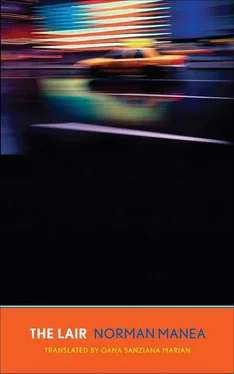Between the teenager who found himself unexpectedly in his relatives’ house and the exile who awoke like a phantom, twenty years later, at the sound of the phone (and in the mind of Professor Gora), was Lu, the wife of Augustin Gora, seen on a summer’s evening, on an abandoned sidewalk.
Old anxieties assaulted Professor Gora’s solitude once again. He would have liked to delay them, to remain in Lu’s story. It pained him and pleased him; it invigorated him; it retrieved him from the void.
He’d closed his eyes, to remain this way with Lu, suspended in the impossible.
After the adolescent’s return home, there was no more than the rare news from the Ga  par family.
par family.
Lu had started to speak more and more about Eva Ga  par. She didn’t know her personally, but she described her with a mix of admiration and apprehension. She called her on the phone. Eva’s anxiety was probably tied to Peter, not to her husband, or so it appeared to Lu. Some kind of maternal fervor. Eva seemed at last to have found, not through her husband, but through her son, some relief from the past. An obsession with Peter’s future had taken hold of her.
par. She didn’t know her personally, but she described her with a mix of admiration and apprehension. She called her on the phone. Eva’s anxiety was probably tied to Peter, not to her husband, or so it appeared to Lu. Some kind of maternal fervor. Eva seemed at last to have found, not through her husband, but through her son, some relief from the past. An obsession with Peter’s future had taken hold of her.
“Eva is possessive,” Gora decided, annoyed. “She’s uncertain about the resolution of her own life. And all too certain about the lives of others.”
Lu shuddered, shocked. She watched him. Frowning, hurt. Frightened, it seemed. The silence had grown, and Gora never brought up the subject of Eva Ga  par again. He resigned himself to listen to the subsequent short bits of information, all of them selected, it seemed, with the aim of contradicting his interpretation.
par again. He resigned himself to listen to the subsequent short bits of information, all of them selected, it seemed, with the aim of contradicting his interpretation.
Peter had been neither a predictable nor a natural choice for Lu. Was he the modest acceptance of the familiar? Lu didn’t value modesty, and didn’t accept psychoanalytical speculations. She considered them frivolous forays devoid of intimacy. She preferred to judge and to be judged on the basis of facts. Though, actually, she didn’t like at all to be judged.
Familiarity, then?
“I’m leaving for a few days, to see the Gaspars. I want to meet Eva. To understand what’s happening over there. Especially, what happened. In that past that wasn’t mine …”
Her husband didn’t hide his perplexity.
“Don’t you see? I live in an aquarium. I can’t, just like that, become a bricklayer on a construction site. Just to see what a wonderful existence our wonderful working class leads, an existence about which I know nothing, except the fairytales I read in the papers. But I can go to the Ga  pars. Not to find out why the prosecutor is no longer a prosecutor, even though the effort would be worth it. But to find out something else, something more painful, probably.”
pars. Not to find out why the prosecutor is no longer a prosecutor, even though the effort would be worth it. But to find out something else, something more painful, probably.”
She wanted out of the aquarium! The family-aquarium? Marriage-aquarium? She’d dreamed of refuge in marriage and family; the familiar had both balanced and stimulated her. So, why this sudden other impulse?
She returned from the Ga  pars with horrific stories of the concentration camps. She was white, pale, as if she had returned from another world. Something essential seemed to have changed. She’d acquired something painful and powerful. She’d decoded, perhaps, mysteries of her own, which had been closed off from her until then. It could be a transfer of one premise to another, thought Gora.
pars with horrific stories of the concentration camps. She was white, pale, as if she had returned from another world. Something essential seemed to have changed. She’d acquired something painful and powerful. She’d decoded, perhaps, mysteries of her own, which had been closed off from her until then. It could be a transfer of one premise to another, thought Gora.
Or had she absorbed something of which she wasn’t conscious, a premise not originally her own? Was she now convinced that it had always been there?
Gora didn’t hear about the bizarre union between Lu and her young cousin Peter until his friend Palade returned from a visit to the faraway country, then just barely out of dictatorship. Palade, called Portland in his adored America, had departed in order to present his fiancee to his family. He returned disgusted by the chaos, the corruption and demagogy that marked the transition from nowhere toward nowhere.
Gora had met Mihnea Palade a long time before that, at the beginning of his time at university, when he was a student. During the period of Eastern totalitarian “liberalization,” when the days and nights of the amphitheater were bloating from the yeast of hope. Exaltation and suspicion competed for supremacy. The mere mathematics student Palade, with his enormous lenses slipping down his fine nose, was quiet for a long time, and then spoke for a long time. No one knew who’d brought him to the attic of simmering controversies. He listened attentively, answered excessively. He was widely read, seemed to know everything, and conscious that he didn’t really know anything. Through the large windows of the university, he measured the horizon in the distance. He worked fastidiously, complained that the library hours were too short.
Having descended from the provinces like a conquistador, he immediately stood out among the students and professors, and was therefore immediately suspect. He was proud of that dubious honor. He wasn’t the only intruder in the group of humanists. The students from the medical and polytechnic schools, some still in high school, and even some former students, who now worked as laborers, or unemployed graduates, were experimenting with a salon of readings and open dialogue.
In that small circle of friends, they discussed books gotten through complicated subterfuges. A feverish, subterranean trade of inacces-sible volumes, an interloping, bookish world. The dark magic of the forbidden and the unknown.
Expatriate authors took on a mythical aura. After the war, some made a name for themselves in the West. The great scholar Cosmin Dima had become the cult model. Palade managed to find his old books, and even some that had been published after the war, in the Occident.
News, books, rumors, debates. The urgency of days and nights. All of it was a mere respite. At any moment, illusions could become prohibitions, or crimes. The sense of the provisional and of impatience kindled the dialogue; no one could withstand impatience.
The French assistant professor Augustin Gora would often mingle with the students. The meetings took place in an attic, in the home of one of the members. An ample loft furnished with old couches and odd chairs. The immense window gave the impression that they were outdoors, on the roof.
Gora attended the discussion of Kafka’s The Trial. The groundless arrest of K. was loaded with connotations; anyone could be arrested, without justification; terror was a juggler of absurd games. Arrested without fault, K. didn’t pretend to be innocent. He seemed burdened by an obscure, metaphysical guilt.
The young tried to liberate themselves from the compromises of the aged, but they also understood their own cowardice in the face of the Authority. They learned to manipulate the official slogans to justify controversy. In shadow themselves, they prowled for spies; there was no shortage of informants disguised as rebels. You could readily identify intelligence, but not character.
Mihnea Palade asked Gora at the end of one night if he could accompany him on his walk home. Along ambling detours through the park by the lakes, Gora allowed himself to be both conquered by friendship and liberated from his own caution. And in the frenzy of this covetous torment, he let slip the fact that he’d received an invitation from an American university. In risking a real conversation, he was recovering his dignity.
The student grew quiet. Not just in response to the confidence that was being entrusted to him, on a first meeting, no less, but also to the news itself. In those years and in that place, isolation was the thing that unified them. The captives of the reading room had a double pretext for their alliance to one another.
Читать дальше

 par family.
par family.










